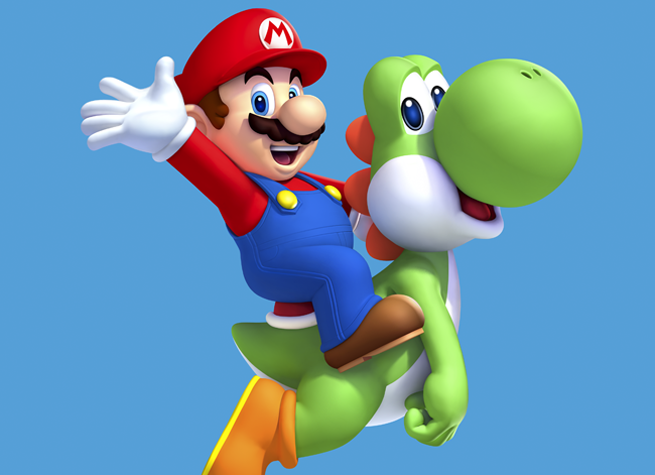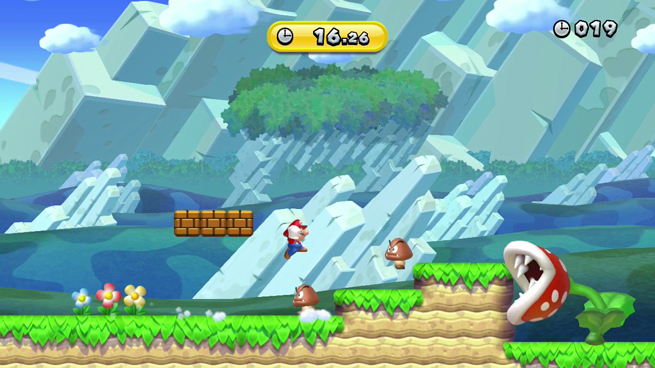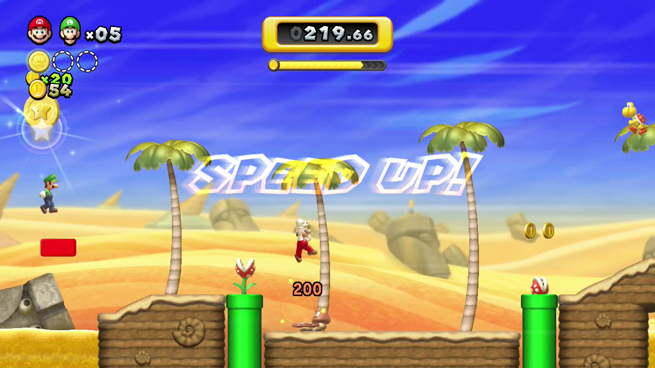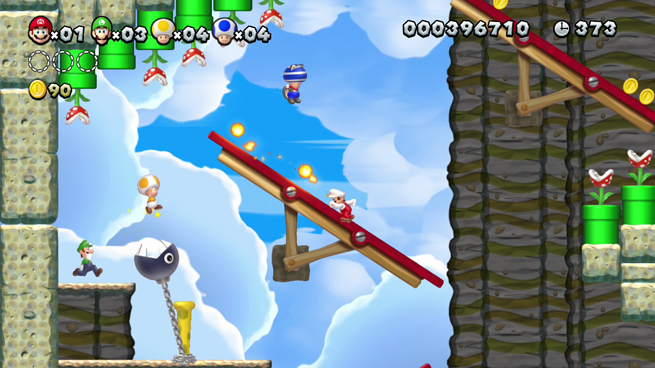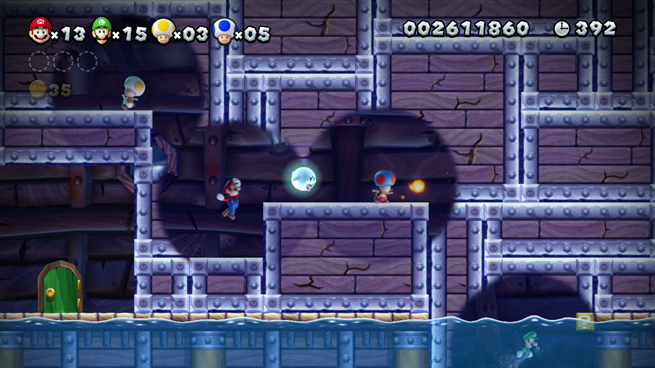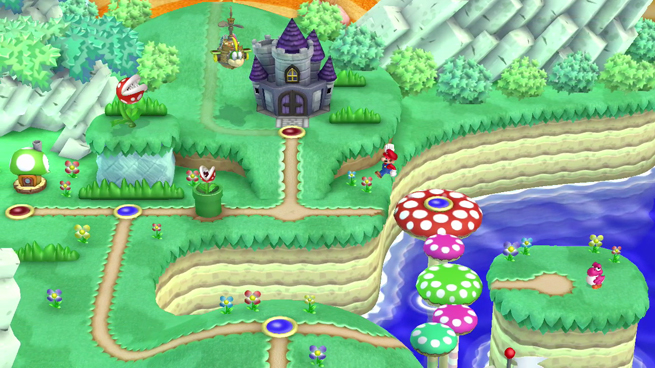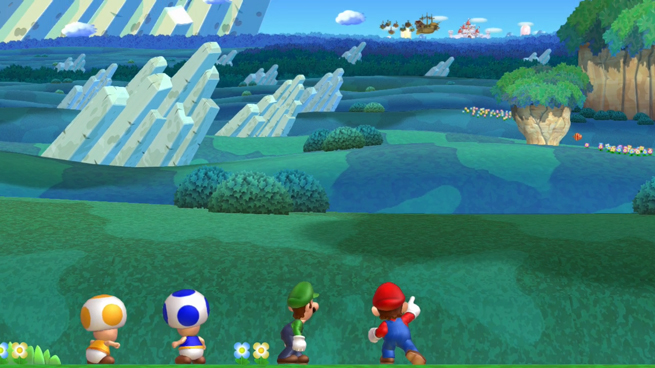Click here for all of GamesBeat’s Wii U launch coverage.
Part of Mario’s charm lies in how you can describe nearly 30 years’ worth of plots in one simple sentence. New Super Mario Bros. U, though, features the only royal abduction that actually cracked me up. Just as Mario, Luigi, and two Toads sit down to cake, Bowser’s gigantic mechanical hand crashes through the roof, daintily moves Peach’s chair out of the way, and then pounds the boys into the floor and hurls them halfway across the Mushroom Kingdom.
It’s enough to make you root for the turtle-dragon this time.
It’s also one of the few surprises. Nintendo’s new Wii U console got its Mario game at launch, but “new”? Really? Because More Super Mario Bros. hits far closer to the mark.
What You’ll Like
It’s a-Mario!
For sheer, unbridled joy, it’s tough to beat a Mario game. They revel in the simple act of play — right down to the springy buzz of jumps and dance interludes. Mario U doesn’t deviate from that formula … or any other.
Core to that equation: sterling level design. Mario U does have a few family-friendly leanings, but make no mistake, this thumb destroyer won’t take it easy on you. Nothing falls under the statutes of torture, but right around World 3, the challenges start pushing hard, and it feels good (the play-it-for-you Super Guide also returns if you get seriously stuck). The series’ haunted levels usually annoy me, but Mario U’s won me over with a smart mix of shrouded rooms, brilliant visuals (one particular favorite features moving Van Gogh backgrounds), pseudo-dead ends, and “not so fast!” rickrolling. Think you’re clever? Mario U already thought two steps ahead of you and planned accordingly.
Only one new power-up makes it into your arsenal, but it’s a good one. The flying squirrel suit gives you serious hang-time, and that’s invaluable in worlds with lots of wide gaps and sheer drops. Baby Yoshis make a long-delayed comeback, munching baddies and spewing bubbles on command. They’re annoying to carry (you must keep the Y button pressed down, which makes timed jumps trickier than usual) and easy to lose but very useful when you’ve got a ground game littered with edible pests.
You can also collect and store up to 10 power-ups out in the hub world (scaled way back from New Super Mario Bros. Wii) and equip one before you begin a level for a nice head start. And just like before, I got quite a laugh out of using abilities not otherwise available in a particular level, like gliding over a forest of Piranha Plants until a wall dropped me to the ground. That’s confidence; the game gave me some freedom but didn’t hand me a blank check. The design work behind Mario U is that strong.
Cool distractions
If you’re not too busy slamming Koopalings and avoiding Chain Chomps, Mario has a few other tasks on his plate both inside and outside the main game. In short, speed runners should prepare for heaven.
My favorite might be the Nabbit, a purple, rabbity thief who leads you on high-speed chase through a completed levels. Catching him nets you a special one-time-only Squirrel Suit that allows unlimited flight. Meanwhile, Boost Rush modes put you in non-stop race where tagging coins accelerates the pace. I wanted to go faster than that mode does. Time Trials better suited my Sonic the Hedgehog-like need for speed.
Money-grabbing Coin Battles return from New Super Mario Bros. Wii as part of the Challenge modes. Coin hunts and stomp-happy 1-Up Rallies will give you quite a workout, but I found myself drifting towards the Special category. This gives you a quick task to accomplish, like dodging fireballs for as long as you can or gliding to the finish line without touching the ground. They play fast, and they’re maddeningly addictive.
Challenge rooms and Toad House minigames also appear in the campaign’s hub world — you can avoid or engage either if your timing’s right — to help you stock up on power-ups. The latter, though generally lucrative, get old almost from the very first time you see them. Despite the repetition, the breaks in flow tend to feel refreshing more than anything.
[vb_gallery id=573127]
Party time
Mario U doesn’t have “party” in the title, but yep … it’s a party game. The four-player modes (both co-op and versus) from New Super Mario Bros. Wii return largely unchanged and serve up just as much entertaining chaos as before. With so much happening onscreen at once, it can get a bit confusing, but rampaging through the Mushroom Kingdom as a four-man pack remains consistently entertaining.
The multiplayer game does have something of a downside. Mario U only supports co-op with the old-school Wiimote controllers, which aren’t included with any Wii U bundle. Hopefully, you didn’t trade them all in at GameStop already. The WiiPad comes in for Boost mode only, allowing a fifth player to stun enemies with a tap or conjure blocks anywhere for the others to bounce on. That’s a nice way to let people with almost zero hand-eye coordination participate, but anyone who really wants to play the game will feel like their mother just sat them down at the kids’ table.
Otherwise, Mario U’s multiplayer still nails the balance, fixing it so low-skill players get their kicks even as champion Mario gamers nail every jump and dispatch any threat. Sure, you can play solo, but this is how you should play the game.
But maybe you noticed how often I said something “returns” from before.
What You Won’t Like
It’s a-same thing!
The formula for side-scrolling platformers staring Nintendo’s mascot hasn’t budged three inches in at least six years. On one hand, I like how dependable and familiar everything feels. The consistency across the board is highly reassuring. In form, function, and quality, Mario U fits right into the franchise, but hardly anything’s changed since 2009’s New Super Mario Bros. Wii. This franchise made a reputation on evolving its own gameplay, and outside of that Squirrel Suit, I’m hard-pressed to think of anything I haven’t seen before.
With the exception of Baby Yoshis (which needed an update from the Super Mario World model), very little in Mario U looks like Nintendo created it specifically for this game. Indeed, as far as I can tell, Nintendo almost entirely reused old assets from Mario Wii (upscaled to HD). Details found in the desert levels look disturbingly familiar. Lava flows in Koopaling Ike’s castle are identical to the magma I dodged three years ago — the last time Super Mario Bros. claimed to be “new.” Even Peach’s castle set from the opening cinematic matches Peach’s castle set from the previous game. It’s like found-object art. The pieces are all the same. Their arrangements differ.
Sure, this means the development team spent their effort on level design rather than asset creation, and the results work nicely. But that’s the hallmark of an annualized series, not a launch title following up on a 3-year-old game. Hell, another franchise from another publisher might’ve released these levels as downloadable content. It doesn’t help that when playing from the smaller WiiPad screen (which I frequently did in favor of my 52″ HDTV), you could easily mistake this for a Nintendo DS game rather than a premier console title.
That is, when you’re not confusing it with its 2009 predecessor.
No online multiplayer
Beating a dead horse? Possibly. But with a new WiFi-capable console that wants to revise a lackluster attention to the Internet, Mario U stands out as the launch title born to be Nintendo’s flagship online-multiplayer game … except it doesn’t actually have online multiplayer, and its publisher has flat run out of excuses why.
Online matchmaking could have been the thing that truly differentiated Mario U from Mario Wii. Its absence here suggests trouble for the rest of the Wii U’s catalog. Mario Kart Wii threw together a rudimentary online mode back in 2008. We can’t do it again? Please?
I get that Nintendo wants to create experiences between people in the same room who laugh and talk and play together. That’s fine. Admirable even. But Nintendo doesn’t get that I want to create those experiences with people any time I want without having to organize a gathering of Wiimote-owning friends. That’s Nintendo’s error, and I’m worried about how much it might cost them in the long run.
Super-easy boss fights
Here’s something that happens a lot in Mario U. You sweat through all manner of hazards — fire, gravity, or Bullet Bills — and scrape through to the end of a level by the slimmest margins only to beat the boss in under 30 seconds with exactly three jumps.
And yes, you just jump on their heads. I hear that works in real life, too.
Few of the Koopalings put up any kind of serious fight, and poor Boom Boom takes an embarrassing amount of abuse. I stopped counting how many times I pounded him shortly after I ran out of fingers. I felt so bad for Wendy Koopa that I nearly gave her a fair chance. Defeating Lemmy Koopa involves a lot of standing completely still. Yay?
In fairness, the boss fights do get a touch tougher by the end — the very end — but I never got past the gnawing sense that I was just putting these fools out of their misery. If Mario carried a sword, they would’ve leapt on it, and I would’ve let them.
Conclusion
Judged in a universe where no other Mario games exist, New Super Mario Bros. U would easily be a triumph. As-is, it feels like a smaller effort, a checklist completed with recycled items. Nintendo fans will enjoy Mario U immensely, and they should. This game carries the standard proudly, offering all the smart level design, split-second escapes, and tight gameplay that creates (and deserves) such devotion. But it’s not a system seller, and it lacks inspiration. Mario U is comfort food … warm, filling, and delicious but not particularly remarkable. And Mario should be.
Score: 83/100
New Super Mario Bros. U releases November 20, 2012 for the Nintendo Wii U. The publisher provided GamesBeat with a copy of the game for the purpose of this review.
VentureBeat's mission is to be a digital town square for technical decision-makers to gain knowledge about transformative enterprise technology and transact. Learn More
